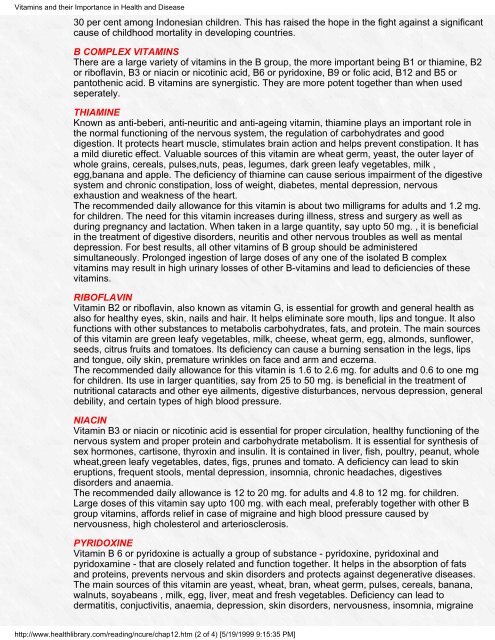A_Complete_Handbook_of_Nature_Cures
A_Complete_Handbook_of_Nature_Cures
A_Complete_Handbook_of_Nature_Cures
Create successful ePaper yourself
Turn your PDF publications into a flip-book with our unique Google optimized e-Paper software.
Vitamins and their Importance in Health and Disease<br />
30 per cent among Indonesian children. This has raised the hope in the fight against a significant<br />
cause <strong>of</strong> childhood mortality in developing countries.<br />
B COMPLEX VITAMINS<br />
There are a large variety <strong>of</strong> vitamins in the B group, the more important being B1 or thiamine, B2<br />
or rib<strong>of</strong>lavin, B3 or niacin or nicotinic acid, B6 or pyridoxine, B9 or folic acid, B12 and B5 or<br />
pantothenic acid. B vitamins are synergistic. They are more potent together than when used<br />
seperately.<br />
THIAMINE<br />
Known as anti-beberi, anti-neuritic and anti-ageing vitamin, thiamine plays an important role in<br />
the normal functioning <strong>of</strong> the nervous system, the regulation <strong>of</strong> carbohydrates and good<br />
digestion. It protects heart muscle, stimulates brain action and helps prevent constipation. It has<br />
a mild diuretic effect. Valuable sources <strong>of</strong> this vitamin are wheat germ, yeast, the outer layer <strong>of</strong><br />
whole grains, cereals, pulses,nuts, peas, legumes, dark green leafy vegetables, milk ,<br />
egg,banana and apple. The deficiency <strong>of</strong> thiamine can cause serious impairment <strong>of</strong> the digestive<br />
system and chronic constipation, loss <strong>of</strong> weight, diabetes, mental depression, nervous<br />
exhaustion and weakness <strong>of</strong> the heart.<br />
The recommended daily allowance for this vitamin is about two milligrams for adults and 1.2 mg.<br />
for children. The need for this vitamin increases during illness, stress and surgery as well as<br />
during pregnancy and lactation. When taken in a large quantity, say upto 50 mg. , it is beneficial<br />
in the treatment <strong>of</strong> digestive disorders, neuritis and other nervous troubles as well as mental<br />
depression. For best results, all other vitamins <strong>of</strong> B group should be administered<br />
simultaneously. Prolonged ingestion <strong>of</strong> large doses <strong>of</strong> any one <strong>of</strong> the isolated B complex<br />
vitamins may result in high urinary losses <strong>of</strong> other B-vitamins and lead to deficiencies <strong>of</strong> these<br />
vitamins.<br />
RIBOFLAVIN<br />
Vitamin B2 or rib<strong>of</strong>lavin, also known as vitamin G, is essential for growth and general health as<br />
also for healthy eyes, skin, nails and hair. It helps eliminate sore mouth, lips and tongue. It also<br />
functions with other substances to metabolis carbohydrates, fats, and protein. The main sources<br />
<strong>of</strong> this vitamin are green leafy vegetables, milk, cheese, wheat germ, egg, almonds, sunflower,<br />
seeds, citrus fruits and tomatoes. Its deficiency can cause a burning sensation in the legs, lips<br />
and tongue, oily skin, premature wrinkles on face and arm and eczema.<br />
The recommended daily allowance for this vitamin is 1.6 to 2.6 mg. for adults and 0.6 to one mg<br />
for children. Its use in larger quantities, say from 25 to 50 mg. is beneficial in the treatment <strong>of</strong><br />
nutritional cataracts and other eye ailments, digestive disturbances, nervous depression, general<br />
debility, and certain types <strong>of</strong> high blood pressure.<br />
NIACIN<br />
Vitamin B3 or niacin or nicotinic acid is essential for proper circulation, healthy functioning <strong>of</strong> the<br />
nervous system and proper protein and carbohydrate metabolism. It is essential for synthesis <strong>of</strong><br />
sex hormones, cartisone, thyroxin and insulin. It is contained in liver, fish, poultry, peanut, whole<br />
wheat,green leafy vegetables, dates, figs, prunes and tomato. A deficiency can lead to skin<br />
eruptions, frequent stools, mental depression, insomnia, chronic headaches, digestives<br />
disorders and anaemia.<br />
The recommended daily allowance is 12 to 20 mg. for adults and 4.8 to 12 mg. for children.<br />
Large doses <strong>of</strong> this vitamin say upto 100 mg. with each meal, preferably together with other B<br />
group vitamins, affords relief in case <strong>of</strong> migraine and high blood pressure caused by<br />
nervousness, high cholesterol and arteriosclerosis.<br />
PYRIDOXINE<br />
Vitamin B 6 or pyridoxine is actually a group <strong>of</strong> substance - pyridoxine, pyridoxinal and<br />
pyridoxamine - that are closely related and function together. It helps in the absorption <strong>of</strong> fats<br />
and proteins, prevents nervous and skin disorders and protects against degenerative diseases.<br />
The main sources <strong>of</strong> this vitamin are yeast, wheat, bran, wheat germ, pulses, cereals, banana,<br />
walnuts, soyabeans , milk, egg, liver, meat and fresh vegetables. Deficiency can lead to<br />
dermatitis, conjuctivitis, anaemia, depression, skin disorders, nervousness, insomnia, migraine<br />
http://www.healthlibrary.com/reading/ncure/chap12.htm (2 <strong>of</strong> 4) [5/19/1999 9:15:35 PM]












![[Pham_Sherisse]_Frommer's_Southeast_Asia(Book4You)](https://img.yumpu.com/38206466/1/166x260/pham-sherisse-frommers-southeast-asiabook4you.jpg?quality=85)




